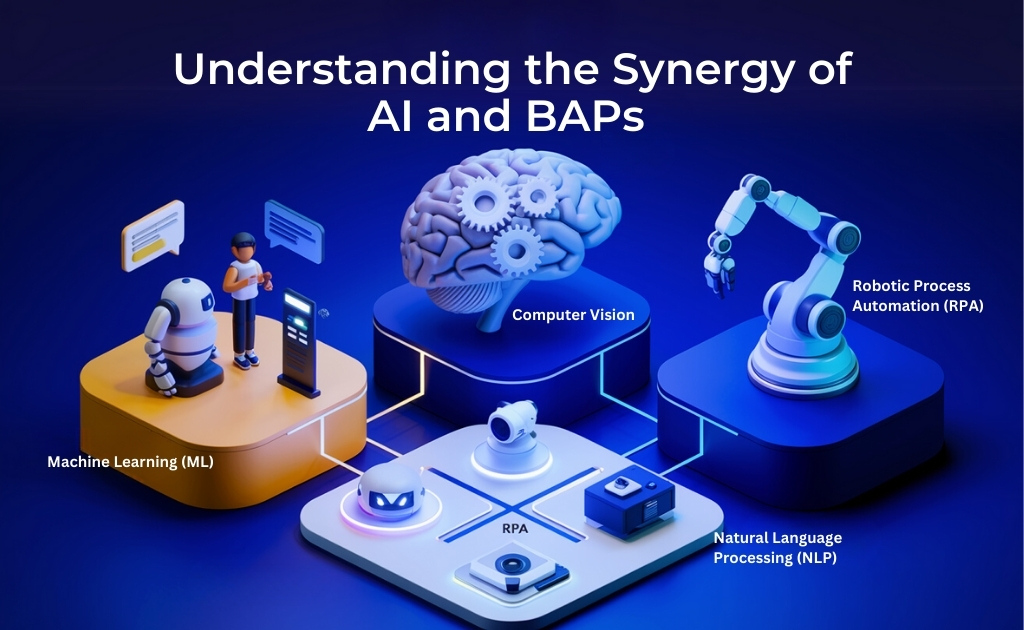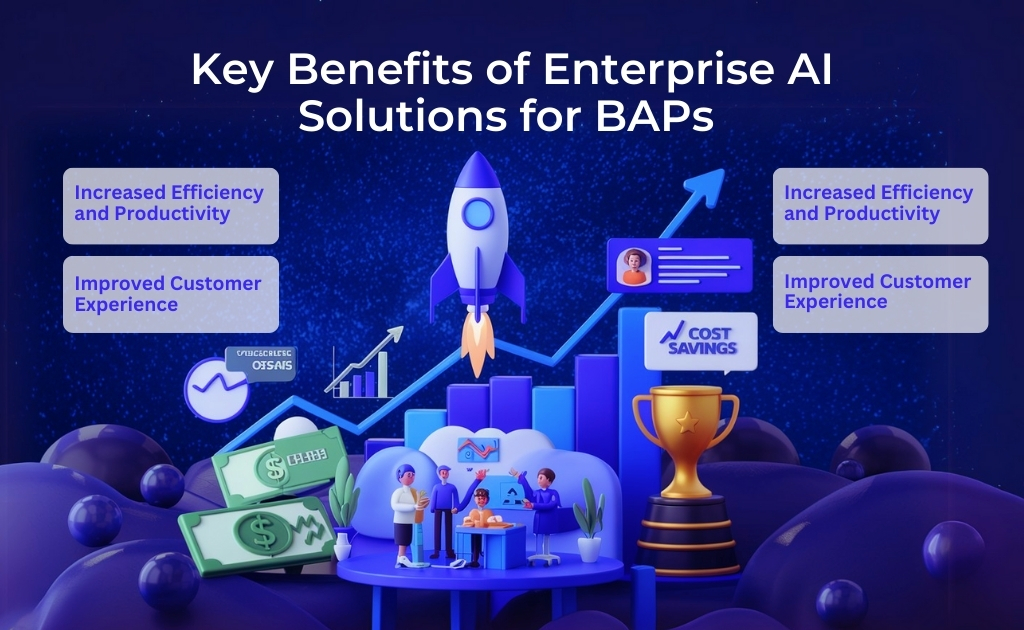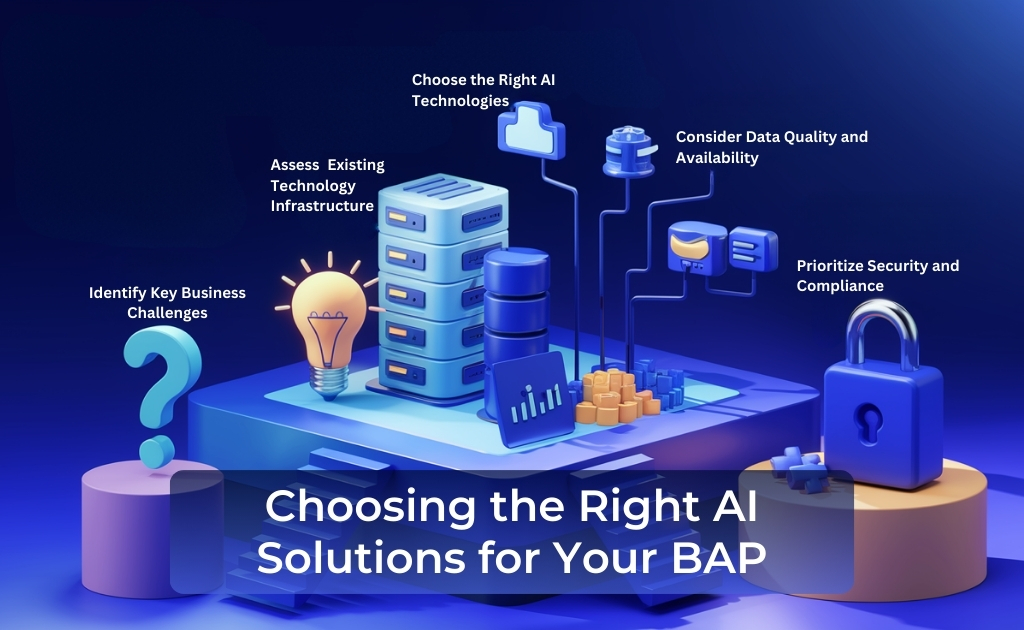Efficiency and agility are paramount in today’s hyper-competitive business horizon. Companies are constantly seeking ways to streamline operations, reduce costs, and gain a competitive edge. This is where the convergence of Enterprise AI solutions and Business Automation Platforms (BAPs) emerges as a game-changer. By integrating advanced AI capabilities into their BAPs, businesses can unlock unprecedented levels of automation, intelligence, and innovation.
Understanding the Synergy of AI and BAPs
Business Automation Platforms (BAPs) are software suites that orchestrate and manage various business processes, such as workflow automation, data integration, and application integration. These platforms empower businesses to automate repetitive tasks, improve data flow, and enhance overall operational efficiency.
The integration of Enterprise AI solutions, such as Machine Learning (ML), Natural Language Processing (NLP), Computer Vision, and Robotic Process Automation (RPA), elevates BAPs to a new level of sophistication.
- Machine Learning (ML) algorithms can analyze vast datasets to identify patterns, predict outcomes, and make intelligent decisions. Within a BAP, ML can be used to:
- Optimize workflows: By analyzing historical data, ML can identify bottlenecks and suggest improvements to workflow processes.
- Predict demand: Forecast customer demand accurately, enabling businesses to optimize inventory levels and adjust production accordingly.
- Personalize customer experiences: Tailor marketing campaigns and customer interactions based on individual preferences and behaviors.
- Natural Language Processing (NLP) allows BAPs to understand, interpret, and generate human language. This enables:
- Automated customer service: Chatbots powered by NLP can handle customer inquiries, provide support, and resolve issues efficiently.
- Intelligent document processing: Extract key information from documents such as contracts, invoices, and applications with high accuracy.
- Sentiment analysis: Analyze customer feedback and social media sentiment to gain valuable insights into customer satisfaction and brand perception.
- Computer Vision enables BAPs to “see” and interpret visual information, such as images and videos. This can be used for:
- Quality control: Automate quality inspection processes by analyzing images of products to identify defects.
- Inventory management: Automatically track inventory levels using computer vision to analyze images of warehouse shelves.
- Fraud detection: Detect fraudulent activities by analyzing images of documents or security footage.
- Robotic Process Automation (RPA) automates repetitive, rule-based tasks, such as data entry, form filling, and report generation. When integrated with AI, RPA can become more intelligent and adaptable:
- AI-powered RPA can handle more complex tasks, such as decision-making and exception handling.
- Machine learning algorithms can be used to train RPA bots to improve their accuracy and efficiency over time.

Key Benefits of Enterprise AI Solutions for BAPs
The integration of Enterprise AI solutions offers numerous benefits for businesses:
- Increased Efficiency and Productivity: Automation of repetitive tasks frees up human employees to focus on more strategic and creative work, leading to significant increases in productivity and efficiency.
- Improved Customer Experience: AI-powered BAPs can personalize customer interactions, provide faster and more efficient support, and enhance overall customer satisfaction.
- Enhanced Decision-Making: By analyzing data and providing valuable insights, AI empowers businesses to make more informed and data-driven decisions.
- Reduced Costs: Automation of manual tasks can significantly reduce operational costs, such as labor costs and the costs associated with errors.
- Competitive Advantage: By leveraging AI and automation, businesses can gain a competitive edge by streamlining operations, improving customer experiences, and developing innovative products and services.

Choosing the Right AI Solutions for Your BAP
Selecting the right AI solutions for your BAP requires careful consideration of your specific business needs and objectives.
- Identify key business challenges: Determine which business processes are most suitable for automation and how AI can address those challenges.
- Assess your existing technology infrastructure: Evaluate your current BAP and IT infrastructure to ensure compatibility with AI solutions.
- Choose the right AI technologies: Select AI technologies that are best suited for your specific use cases.
- Consider data quality and availability: Ensure that you have access to high-quality data to train and deploy AI models effectively.
- Prioritize security and compliance: Implement robust security measures to protect sensitive data and ensure compliance with relevant regulations.

The Future of AI and BAPs
The integration of Enterprise AI solutions with BAPs is an ongoing evolution. As AI technologies continue to advance, we can expect to see even more sophisticated and impactful applications in the future.
- AI-powered process discovery: Automatically identify and map complex business processes, enabling more efficient automation.
- Hyperautomation: The seamless orchestration of multiple AI technologies and automation tools to achieve end-to-end process automation.
- AI-driven predictive maintenance: Predict and prevent equipment failures, reducing downtime and maintenance costs.
- Intelligent process mining: Analyze process execution data to identify inefficiencies and areas for improvement.
Conclusion
By embracing the power of Enterprise AI solutions, businesses can unlock the full potential of their Business Automation Platforms. By automating tasks, improving decision-making, and enhancing customer experiences, AI-powered BAPs are driving significant value across industries. As these technologies continue to evolve, businesses that embrace this convergence will be well-positioned to thrive in the increasingly competitive and dynamic business world.
